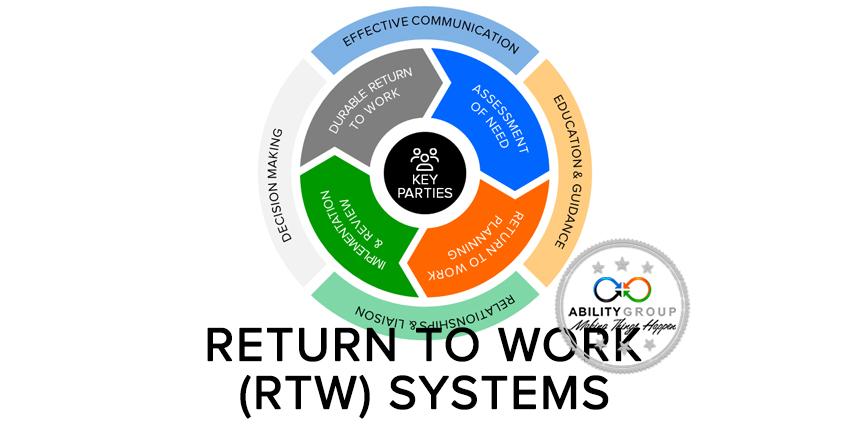
by Marc Ring | Mar 25, 2024 | Claim management, Injury Management, Injury Prevention, Work Health & Safety, Workers Compensation
Based on discussions with clients, the importance of early notification is not as widely known as expected. With workplace injuries, early notification, contact and support typically result in better health and recovery outcomes. Workers are more likely to stay or return when risks are managed and support starts early.
(more…)

by ABILITY GROUP | Mar 11, 2024 | Claim management, Injury Management, Injury Prevention
In the context of workers’ compensation, a pre-existing condition refers to a medical condition or injury that an employee had prior to their employment or that existed before a workplace incident occurred. These conditions can include chronic illnesses, prior injuries, or other health issues that the worker had before the workplace incident.
(more…)

by Marc Ring | Feb 26, 2024 | Injury Management, Return To Work, Workers Compensation
An effective RTW system ensures safe, timely employee recovery and reintegration after injury or illness. We explore the components that are essential for developing an effective RTW System.
(more…)

by ABILITY GROUP | Feb 19, 2024 | Claim management, Injury Management, Injury Prevention, Managing Psychosocial Hazards
In recent years, Australia has witnessed a concerning surge in workers’ compensation claims related to mental health issues. This trend highlights rising mental health awareness and the need for strong workplace support systems. We delve into the factors contributing to this rise and explore potential solutions to address rising mental health claims.
Understanding the Rise
The increase in mental health-related workers’ compensation claims in Australia is multifaceted and can be attributed to several key factors:
- Heightened Awareness: There has been a significant increase in awareness and recognition of mental health issues in the workplace. Employees are now more inclined to report mental health-related issues, leading to a rise in compensation claims
- Work-Related Stress: Modern workplaces often operate in high-pressure environments, leading to increased levels of work-related stress. Factors such as long working hours, tight deadlines, and job insecurity contribute to heightened stress levels among employees
- Stigma Reduction: Efforts to reduce the stigma surrounding mental health have encouraged individuals to seek help when experiencing psychological distress. This has resulted in more employees coming forward to seek support and lodging compensation claims for work-related mental health issues
- Changing Work Dynamics: Remote work, accelerated by COVID-19, brings isolation, blurred boundaries, and mental health challenges.
- Inadequate Support: Many workplaces still lack resources to effectively address mental health needs. This deficiency can exacerbate existing problems and contribute to the rise in compensation claims
Addressing the Issue
To address rising mental health claims, implement strategies that prioritise employee well-being. Here are some potential solutions:
- Promoting Mental Health: Employers should prioritise awareness programs to build a supportive, inclusive workplace. This includes providing education on stress management, resilience building, and destigmatising conversations around mental health
- Work-Life Balance: Promote flexible schedules, regular breaks, and manageable workloads to reduce stress and support well-being
- These services should be easily accessible and confidential to encourage employees to seek help when needed
- Training Managers and Supervisors: Providing managers and supervisors training on recognising signs of mental distress, managing workloads effectively, and offering appropriate support can play a crucial role in preventing mental health issues and reducing workers’ compensation claims
- Creating a Psychologically Safe Environment: Organisations must prioritise creating a psychologically safe work environment where employees feel comfortable discussing mental health concerns without fear of judgment or reprisal. Open communication channels and supportive leadership are essential in fostering trust and well-being.
- Regular Monitoring and Evaluation: Employers should regularly monitor and evaluate the effectiveness of their mental health initiatives to identify areas for improvement and ensure that the needs of employees are being met adequately
The rise in mental health-related compensation claims in Australia underscores the urgent need for proactive workplace support. Prioritizing awareness, supportive policies, and open culture can reduce risks and build resilient, healthy workplaces. Collaboration among employers, policymakers, and stakeholders is key to ensuring workforce well-being
Mental health or psychological workers compensation claims are typically 7-8 times more than physical injuries. They are often complex & if not actively managed, they can have substantial impacts to your business.
Need help with a psychological or mental health related claim, contact our team to discuss.
For further information, please refer:
Source: SafeWork
Title: Psychological health and safety in the workplace report
Read Time: 10+ minutes

by ABILITY GROUP | Jan 7, 2024 | Injury Management, Workers Compensation
The Return to Work Process following an injury can often be daunting for everyone involved. So what can be done to help minimise risks and make the process as smooth as possible?
(more…)

by ABILITY GROUP | Nov 6, 2023 | Injury Management, Injury Prevention, Work Health & Safety, Workers Compensation
To help prevent hearing loss in the workplace, employers must provide hearing tests to workers who frequently use hearing protection to control noise that exceeds the exposure standard.
(more…)






